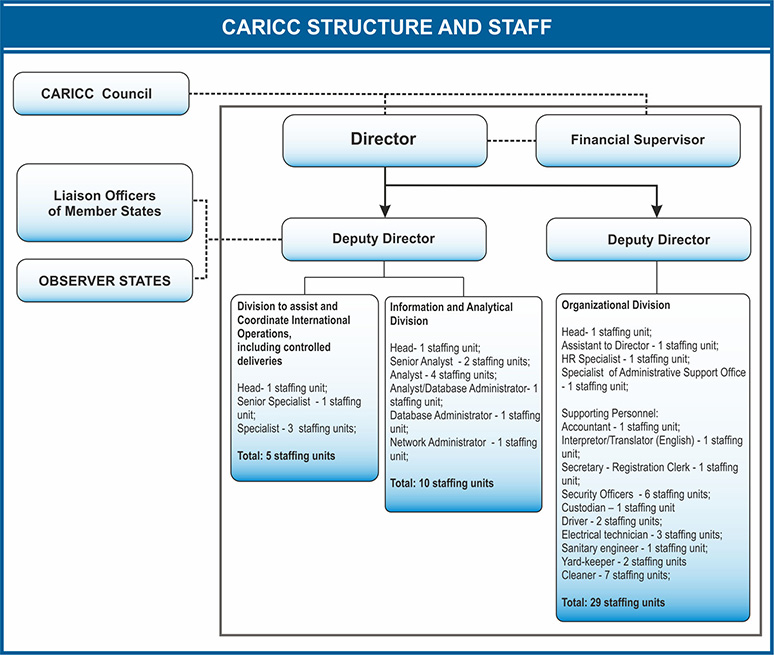Attachment to
the Agreement between the Republic of Azerbaijan, the Republic of Kazakhstan, the Kyrgyz Republic, the Russian Federation, the Republic of Tajikistan, Turkmenistan, the Republic of Uzbekistan on establishment of the Central Asian Regional Information and Coordination Centre for Combating Illicit Trafficking of Narcotic Drugs, Psychotropic Substances and their Precursors
REGULATIONS
on the Central Asian Regional Information and Coordination Centre for Combating Illicit Trafficking of Narcotic Drugs, Psychotropic Substances and their Precursors
The present Regulations define the objectives and functions of the Central Asian Regional Information and Coordination Centre for combating illicit trafficking of narcotic drugs, psychotropic substances and their precursors, the procedure of fulfilment of objectives, appointment and recall of the persons seconded to the CARICC.
1. Objectives and Functions
Objectives and functions of the Centre are as follows:
1.1. Coordination of the efforts of the Member States in combating illicit drug trafficking at the regional level;
1.2. Establishment of the mechanisms of cooperation between competent authorities of the Member States;
1.3. Facilitation of the enhanced cooperation between the competent authorities of the Member States in combating trans-border organised crime associated with illicit drug trafficking;
1.4. Assistance in organising and undertaking joint operations, investigations, including controlled deliveries;
1.5. Collection, storage, protection, analysis and exchange of information to combat illicit drug trafficking;
1.6. Assistance in standardising information systems, including the databases of competent authorities of the Parties;
1.7. Development of the procedures on systematised accumulation of information, design and development of the Centre's database;
1.8. Introducing standard information exchange format and systems;
1.9. Installation and operation of advanced software for information analysis;
1.10. Analysis of the drug situation and development of appropriate recommendations;
1.11. Assistance to the competent authorities of the Parties, as well as other states whose territory is used for illicit production and trafficking of narcotic drugs, in the implementation of anti-drug programmes as requested;
1.12. Assistance in the harmonisation of the legal and regulatory framework of the Member States in the sphere of combating illicit drug trafficking;
1.13 Holding conferences, training, and seminars pertaining to the enhancement of methods to combat illicit drug trafficking and strengthen international cooperation in this effort.
2. Personnel
2.1. The Centre is headed by a Director who is appointed and dismissed by the leaders of the Member States based on the recommendations of the Council;
2.2. For the first two years of the Centre’s activities, a representative of the host state shall be appointed as Director. Subsequently, representatives of Member States shall be appointed as Directors on a rotational basis every two years in the order of the first letters of the names of the member States in the Russian alphabet;
2.3. The Director may resign on his/her own initiative before the term is finished, or may be dismissed based on reasonable grounds submitted by one of the Member States;
2.4. Appointment and dismissal of the deputy/deputies of the Director shall follow the same procedure (except for p. 2.2). The Director, deputy/deputies cannot be citizens of the same state;
2.5. The Director of the Centre:
? executes the general management of the Centre and bears personal responsibility for the fulfilment of the Centre's objectives;
– submits to the Council the organisational structure and staffing list of the Centre;
– defines the duties, rights and obligations of deputy/deputies director, other officials, and employees of the Centre; controls the execution of their duties; gives incentives and undertakes disciplinary actions;
– issues orders, including on appointment and dismissal of CARICC officials and employees;
– represents the Centre in relations with the governmental and administrative bodies of the Parties and other states, as well as with international organisations;
– administers the budget of the Centre, and reports annually to the Council on the validity of expenditures;
2.6. The Director shall be empowered to make contracts on behalf of the Centre, purchase, and/or lease movable and immovable property required for the operation of the Centre, manage the property, open and maintain bank accounts, represent the Centre in legal proceedings; study opportunities to obtain financial and other resources from donor states, international financial institutions and international organisations;
2.7. The Personnel of the Centre shall be hired under contract on a competitive basis;
2.8. The officials of the Centre do not have the right:
– to be engaged in commercial or other activity for personal benefits or the benefit of other persons (except for scientific, creative, and academic activity);
– to be engaged in activity incompatible with the status of international employees, in particular, to use his/her official position in the interests of political parties and/or associations;
– to receive compensation (gifts, money, loans, payment for entertainment and leisure, etc.) from natural or legal persons and public organisations, for non-fulfilment and/or improper fulfilment of his/her official duties;
– to be a member of a legislative (representative) government body, or institutions of local governance;
– to use material, financial, technical, information and other resources of the Centre for purposes other than required for the fulfilment of assigned duties;
2.9. The personnel of the Centre and liaison officers should avoid any actions or statements in public, whether verbal or in writing, that may cause damage to the Centre or the national interests of the Member States;
2.10. Remuneration of the personnel of the Centre shall be paid from the budget of the Centre;
2.11. The personnel of the Centre shall have an annual vacation, the duration of which shall be calculated based on two and a half days for each month of work at the Centre;
2.12. When signing or terminating the contract with the official, all administrative and financial issues shall be resolved by the Centre;
2.13. The grounds for termination of the contract with an official are as follows:
? expiration of the contract;
? upon the initiative of the official;
? liquidation, reorganisation of the Centre or staff reduction;
? violation of terms and conditions of the contract by the official;
? recall by the seconding Member State;
? inability to fulfil his/her duties due to reasons or circumstances beyond the control of the parties;
2.14. The personnel of the Centre will have Identification Cards of a certain format issued to them.
3. Procedures for the Selection, Seconding, and Recall of Personnel
3.1. The officials are contracted for a period of two years on a competitive basis based on the recommendations of the Member States. The contract may be extended by the Director in consultation with a seconding state;
3.2. Candidates for vacant positions at the Centre shall be selected from the representatives of the competent authorities of the Member States in compliance with the national legislation of the Parties. The candidates shall be selected on the basis of the principle of equal representation of Member States. The candidates shall be subjected to the checks by the competent authorities of the seconding state and if necessary should possess security clearance to work with secret information;
3.3. The candidates should meet the following requirements:
– to be a citizen of one of the Parties;
– to have professional expertise as required for a specific position;
– to have work experience with the competent authorities of the Parties;
– to have good command of the working language of the Centre;
– to be skilled in using modern office equipment, including computer systems as well as communication equipment;
– to have obtained a university degree;
3.4. The candidates should meet the following general qualification requirements:
Director of the Centre
– should have no less than 15 years of work experience at the central administration of the competent authority of the seconding state and no less than 10 years of experience in an executive position that required addressing the issues within the competence of the Centre;
Deputy Director
– should have no less than 12 years of work experience at the central administration of the competent authority of the seconding state, including no less than 8 years of experience in an executive position that required addressing the issues within the competence of the Centre;
Advisor
? should have no less than 10 years of work experience at the central administration of the competent authority of the seconding state;
Senior Expert
– should have no less than 8 years of work experience at the central administration of the competent authority of the seconding state;
Expert
– should have no less than 5 years of work experience at the central administration of the competent authority of the seconding state;
3.5. The candidates for the positions of supporting personnel of the Centre should meet the following requirements:
Translators
– should have no less than 3 years of uninterrupted work experience as translator, an excellent command of Russian and English, as well as, desirably, of the state language of the host state;
Accountants
– should have no less than 5 years of uninterrupted work experience as chief accountant in government and international organisations;
– have the skills in using and developing computerised data processing for accounting purposes;
– have a good command of Russian and English and knowledge/experience in working with international organisations;
Maintenance
– should have university degree or higher special technical education;
– should have no less than 3 years of work experience in the required capacity;
– should have experience in operating and maintaining communal - general systems, and various office equipment;
– should have a driving license and adequate driving skills;
Office work and archive
– should have higher or specialised secondary education;
– should have skills in record keeping, including working with secret documents. Should have no less than 5 years of work experience in record keeping and archiving;
– should have skills in working with computer systems;
– should have command of Russian, knowledge of English is desired;
Secretary
– should have no less than 5 years of work experience as secretary;
– should be experienced with computers and other office equipment;
– should have command of Russian, knowledge of English is desired.
4. Liaison Officer
4.1. Liaison officers shall be seconded to the Centre based on recommendation from the competent authorities of the Parties they work in. The duration of secondment and work procedures of liaison officers shall be set in compliance with the legislation of the seconding state;
4.2. Liaison officers seconded to the Centre should meet the following requirements:
? to have no less than 10 years of experience in the operational departments of the competent authority;
? to have experience in an executive position at the head-quarters of the competent authority;
? to possess analytical skills;
? to be skilled in using modern office equipment, including computer systems;
? to have a good command of the official language of the Centre;
? to have the level of clearance which allows to work with secret information, if necessary;
4.3. In the course of executing their duties, the liaison officers are bound to:
? represent the interests of the competent authorities of the seconding state;
? ensure exchange of information between the Centre and the competent authorities of the seconding state;
? cooperate with liaison officers from the other Member States;
? assess information received by the Centre and from liaison officers and send it to the competent authorities of the seconding state;
? control the procedures of handling information with restricted access provided by the seconding state to the Centre;
? participate in the analysis of information received from the seconding state on request of the Centre or liaison officers from the other Member States;
? consult the Centre and liaison officers from the other Member States on provisions of the national legislation;
? facilitate cooperation between competent authorities of the Member States, national competent authorities and the Centre;
? facilitate the organisation and execution of agreed joint international operations, investigations, including controlled deliveries;
? brief the Centre and liaison officers from Member States on changes in the illicit drug trafficking situation of the seconding state;
? develop proposals on harmonisation of the legislation of the Member States;
? participate in the development of the CARICC CDB;
4.4. The Centre shall support liaison officers in the execution of their duties, including:
? the consideration of inquiries of the liaison officers in a timely manner, and provision of required assistance;
? ensuring the effective work of the liaison officers, including provision of equipped office space;
? the timely resolution of issues arising in the course of their work;
4.5. The Liaison Officer:
? coordinates his/her work with the Deputy Director;
? observes the internal rules of the Centre;
? makes every effort to achieve the goals and objectives of the Centre;
? provides information on his/her activity to the management of the Centre on a monthly basis;
4.6. The Director has the right to seek from the competent authority of the seconding state an early recall of the Liaison Officer if the latter does not properly execute the assigned duties;
4.7. The liaison officers have the right to use CARICC CDB according to the assigned access level and his/her tasks;
4.8. Annual and other types of leave shall be provided to the liaison officers upon their requests to the national competent authority of the seconding state. Granting leaves shall be done in coordination with the management of the Centre;
4.9. Liaison officers will adhere to their respective national legislation as far as the national dates/holidays are concerned. Liaison officers shall submit the list of national dates/holidays certified by the competent authority.
5. Observers
5.1. The status of the Observer at the Centre may be granted to a third Party. Decision on granting, suspension, or cancellation of the Observer status is made by the Council;
5.2. The procedure of granting the status of observer at the CARICC implies:
? the submission of an application of a state/a competent international organisation addressed to the Director of the CARICC;
? the submission of the observer status application by the Director to the Council for consideration;
? the study of the application and consensus-based decision of the Council on granting the observer status;
5.3. A state and/or an international organisation given the status of the observer at the CARICC shall communicate with the Centre via their representatives at the Centre;
5.4. A representative of an observer state should meet the following criteria:
? must already be working with the competent authority;
? should have at least 10 years of work experience in operational departments;
? should have work experience in an executive position in the competent authority’s central administration;
? must possess analytical skills;
? must be skilled in using modern office equipment, including computer systems;
? must have the level of clearance which allows for work with secret information, if necessary;
5.5. In his/her activities the representative of an observer:
? ensures the adequate exchange of information of mutual interest between the Centre and competent authorities of the seconding state/ international organisation;
? cooperates with liaison officers of the Member States;
Furthermore, the representative of an observer:
? represents the interests of the competent authorities of the seconding state;
? consults the Centre and liaison officers from the Member States on the provisions of his/her national legislation;
? when required, facilitates the organisation and the execution of agreed joint international operations, investigations, including controlled deliveries;
? briefs the Centre on changes in the drug situation in seconding Member State;
5.6. The representative of an observer has the right:
? to be present, without voting rights, at official open meetings of the management of the competent authorities of the Member States on issues of combating illicit drug trafficking. At these meetings the representative of an observer can participate in the discussion;
? to submit proposals to the Director of CARICC for the subsequent consideration by the competent authorities of the Member States;
? to send and receive inquiries to and from the Centre;
5.7. Terms and conditions of stay of the representatives of observers in the host state shall be regulated by the Agreement between the Government of the host state and the Central Asian Regional Information and Coordination Centre for combating illicit trafficking of narcotic drugs, psychotropic substances and their precursors.
6. CARICC Centralized Database
6.1. The CARICC CDB is an automated information system, comprised of databases, hardware and software, communication equipment, peripheral and other devices used for computer-aided collection, storage, processing and protection of data;
6.2. The Primary objectives of establishing the CARICC CDB are:
? the collection and storage of information resources of the competent authorities of the Member States pertaining to combating illicit drug trafficking;
? the analysis of various data pertaining to this area;
? the enhancement of regional coordination of law enforcement activities in the exchange of information resources;
6.3. The CARICC CDB shall accumulate information on illicit drug trafficking and drug-related crime. The information shall be shared by the competent authorities of the Member States and CARICC;
6.4. The CARICC CDB shall be designed based on the information resources received from the competent authorities of the Member States in compliance with the regulations of the national legislation of the Member States on exchange and protection of information, as well as other sources of information;
6.5. The CARICC CDB shall function based on the standard hardware and software that is duly verified and certified, unified information resources, common formats and data classifiers, standard data exchange protocols and information exchange procedures as determined by CARICC with consideration of the national legislation of the Member States;
6.6. CARRIC shall be responsible for the functioning of the CARICC CDB. CARICC together with the Member States shall ensure reliable operation of the software-hardware system of the CARICC CDB, computer-aided collection, storage, classification and processing of information, and ensure that requirements on handling of data with restricted access are met;
6.7. Information resources accumulated in CARICC CDB shall be the property of the Member State which provides this information. CARICC shall ensure that information contained in the CARICC CDB will be shared with Member States upon request and in coordination with the owner of the information. In the case of information requests of the CARICC CDB by states which are not members of CARICC, or by competent international organisations, the access to information shall be addressed in coordination with the Member State which provided this information;
6.8. Information accumulated in the CARICC CDB shall contain data on seizures of illicit drugs, description of circumstances which led to the seizures; data on natural and legal persons involved into illicit drug trafficking; information on regulations and legal acts of the Member States applicable to this area; reference, analytical and statistical information related to illicit drug trafficking. The CARICC CDB may contain other information on illicit drug trafficking provided by the Member States. A recommended List of Data to be contained in the provided information is given in Annex 1 to the present Regulations;
6.9. The Member States commit themselves to provide complete and accurate information according to the List of Data of the CARICC CDB;
6.10. Each piece of the provided data shall be stored in the CARICC CDB together with information on the owner of this data - Member State and competent authority, as well as the procedure to access this data;
6.11. The users of the CARICC CDB are CARICC and competent authorities of the Member States;
6.12. Exchange of information within the CARICC CDB shall be duly protected. This shall include the use of secured communication channels, identification and authentication of information sources; ensuring authorised access, methods of preventing unauthorised access, registration of information users;
6.13. The users of the CARICC CDB shall receive information according to the level of access assigned to them. The level of access shall be set by CARICC in coordination with the Member States based on the level of protection of the accumulated information;
6.14. The competent authority supplying the information to the CARICC CDB shall be responsible for the choice of the appropriate confidentiality and access level for the information supplied. When selecting the access level, the competent authorities shall consider the appropriate classification and security standards of information in compliance with their national legislation;
6.15. The CARICC shall inform the competent authorities of the Member States on information that relates to them as well as on links detected between crimes and offences;
6.16. Users of information obtained in the course of exchange or obtained from the CARICC CDB shall be liable in compliance with their national legislation for the violation of confidentiality requirements, protection procedures and improper use or processing of information;
6.17. CARICC jointly with the Member States shall:
? study and develop unified formats of data provision and transmission, determine the procedure of using, processing and providing information to interested users;
? prepare the Terms of Reference for the development of the CARICC CDB and the provision of interoperability of differently structured computer-aided information systems of the competent authorities of the Member States, as well as requirements for information protection;
? approve the composition and requirements of the hardware for the CARICC CDB and the nodes to be established in the Member States in order to provide remote access to the information resources of the CARICC CDB;
? determine the time and procedure for providing and obtaining information;
? determine the forms for accounting documents, sample forms for reports, and the way they should be filled in;
6.18. The Member States shall provide secured communication channels that will allow interaction between the CARICC CDB and remote nodes in the Member States; install hardware and applied software that shall provide interoperability between the CARICC CDB and differently structured computer-aided information systems of the Member States, allowing the use of common format for the storing and exchange, and common procedures for the collection, storage, protection, processing and delivery of information to the users concerned;
6.19. When a Member State secedes from the CARICC Agreement, the right to further usage of the information provided by this state shall be coordinated with this state;
6.20. In case of reorganisation or termination of CARICC's activity, further use of information contained in the CARICC CDB shall be resolved by Member States via discussion.
7. National Coordinating Body
7.1. The National Coordinating Body shall:
? provide information to the CARICC CDB;
? respond to the requests of the Centre on the provision of information;
? request expert assessment of information from the Centre;
? request information from the CARICC CDB or from other Member States;
? communicate requests on the execution of joint operations and investigations, including controlled deliveries, to the Centre and receive the same from the Centre;
? consult on provisions of the national legislation.
8. Budget, Auditing and Financial Management
8.1. Control over all liabilities and payments, as well as the collection of allocated funds shall be carried out by the financial controller and auditors. Certain income and expenditure accounts may be subject to follow up monitoring;
8.2. The Director of the Centre shall submit a financial statement to the Council as well as to the international organisations and donor-countries that are financing the Centre on a quarterly basis;
8.3. The financial year starts on January 1 and ends on December 31;
8.4. Budget income and expenditure accounts, financial statements of the Centre are subject to annual auditing. Thereto, the Director shall submit the annual report to the Council no later than March 31 the following year;
8.5. The Director of the Centre shall provide the auditors with all the required information and ensure all possible support as may be needed;
8.6. The Decision to authorise the budget performance for respective financial year may be changed by the Council based on the official opinion of auditors on the financial statement;
8.7. The financial controller shall be hired on a competitive basis. The financial controller shall be appointed and dismissed by the Council. The financial controller shall report only to the Council;
8.8. The functions of financial controller and accountant of the Centre cannot be performed by the same person;
8.9. The financial controller shall control:
? all accounts payable of the Centre;
? all expenditures of the Centre;
? all incoming funds of the Centre;
The financial controller shall carry out follow-up monitoring of certain income and expenditure accounts;
8.10. When having substantial grounds, the financial controller can withhold authorisation for financial operations/transactions. If this is the case, he/she must inform the management of the Centre and the accountant and point out the reasons for such a decision;
The Director considers the matter and either agrees or disagrees with the reasoning presented by the financial controller. If the latter is the case, then the Director may approve the execution of this financial operation;
The Council and auditors shall be informed about any case of this nature;
8.11. Reports on each individual inspecting shall be submitted to the Director, the Council and to the international organisations and donor-countries that finance the Centre. The Director shall inform the Council, international organisations and donor-countries, which are financing the Centre, on the follow-up measures undertaken based on the report;
8.12. Each year, the financial controller shall prepare an annual report on the performance of internal finance control procedures and submit it to the Council, as well as to the donor-countries and international organisations which are financing the Centre;
8.13. The accountant of the Centre shall be authorised to affix the second signature on the financial documents.

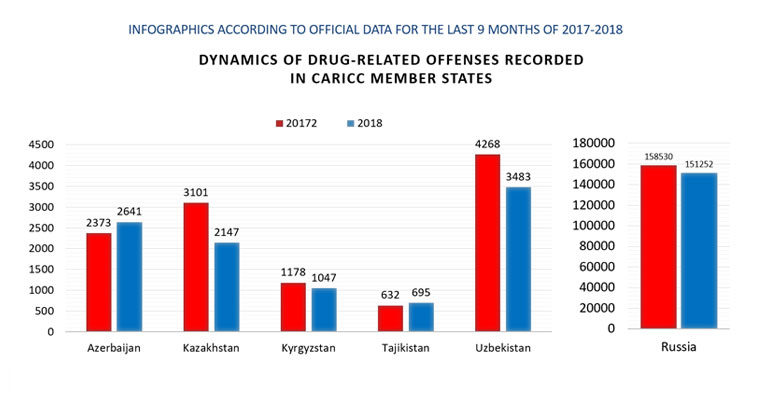
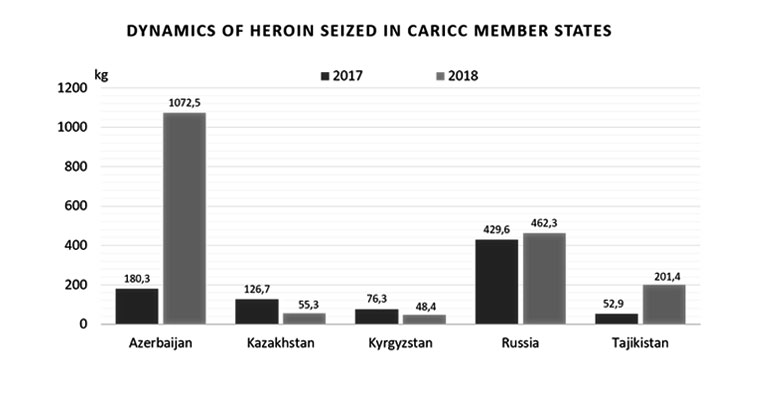
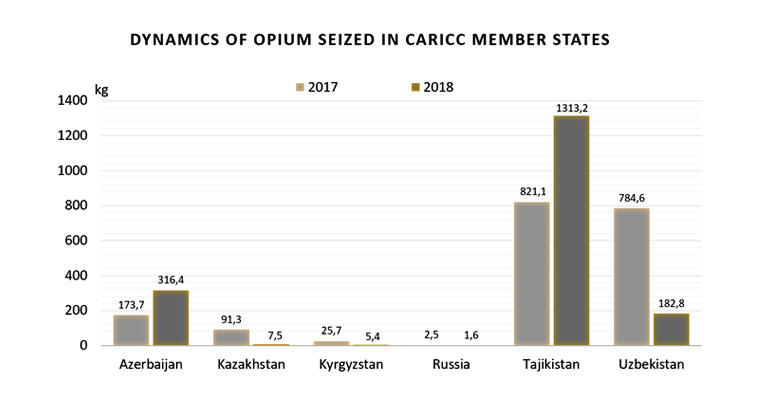
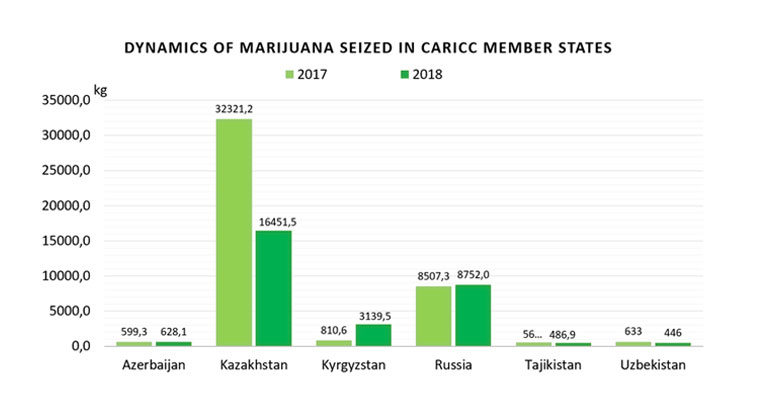
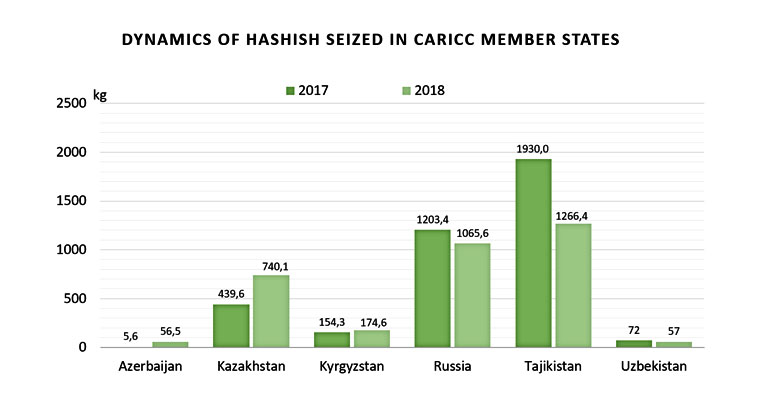











 The project on establishment of CARICC was launched by UNODC in late 2004 and the decision was taken to break project into phases. This decision was based on the need to introduce step-by-step implementation of the activities of the project and due to limited donor funding at that time.
The project on establishment of CARICC was launched by UNODC in late 2004 and the decision was taken to break project into phases. This decision was based on the need to introduce step-by-step implementation of the activities of the project and due to limited donor funding at that time. Brian Taylor - former Chief, Anti-Trafficking Section, United Nations Office on Drugs and Crime (UNODC).
Brian Taylor - former Chief, Anti-Trafficking Section, United Nations Office on Drugs and Crime (UNODC). Tofik Murshudlu – then UNODC Regional law enforcement adviser. March 2005 - November 2012 Senior Coordinator of the UNODC project on establishment of CARICC, Head of UNODC office in Almaty. Currently Chief of Implementation Support Section, Organized Crime and Illicit Trafficking Branch, Division for Treaty Affairs, United Nations Office on Drugs and Crime HQ in Vienna.
Tofik Murshudlu – then UNODC Regional law enforcement adviser. March 2005 - November 2012 Senior Coordinator of the UNODC project on establishment of CARICC, Head of UNODC office in Almaty. Currently Chief of Implementation Support Section, Organized Crime and Illicit Trafficking Branch, Division for Treaty Affairs, United Nations Office on Drugs and Crime HQ in Vienna.